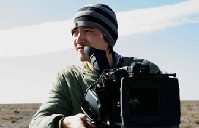Tibet commander commemorated
"Thanks to his immediate reaction and intimate knowledge of Lhasa, we could stop the riots very quickly," recalls Chendrup. "He knew the city and people here so well. A few days before the incident, he could predict that something bad would happen in the city. Then we were well-prepared and could soon restore stability to the city of Lhasa."
According to Guo's wife, after that incident he spent much more time working in Lhasa and rarely returned home. Guo's parents recalled that their son would come home when he had meetings in Chengdu but would stay at home no more than 30 minutes each time.
"He was always busy and comforted me that we would have more time after his retirement," Zhong says.
| Documenting trends |
| Flying high once more |
Because of the low temperature and high-altitude hypoxemia, it's hard to see green plants in winter and spring. Many soldiers suffered from hair loss and cracked lips caused by vitamin deficiencies. When Guo worked as the head of the General Logistics Department of the People's Armed Police Forces in Tibet in 2000, he invited experts to bring greenhouse technology to Tibet and successfully grew cherry tomatoes and cucumbers, boosting the health of soldiers.
"Because he grew up as an ordinary soldier, he loved soldiers very much," says Chendrup. "He visited every detachment in Tibet from Lhasa to Nagchu to learn about their living conditions. His car was his office."
To ensure the security of the 2008 Beijing Olympic torch being carried onto the world's highest mountain, Mount Qomolangma, Guo worked for over a month on the mountain known in the West as Mount Everest, which was a big challenge to his heath.
"He broke down from constant overwork," adds Chendrup.
Born in Ya'an, Sichuan province, Guo had strong will power since childhood, which was why his father gave him the name Yili, meaning perseverance.
According to Guo Quanzhong, Guo's 83-year-old father, his son carried stones to make money for school fees because of his family's poverty. Becoming a soldier was his childhood dream and he finally realized it at age 18.
"He planted a tree in the yard of the People's Armed Police Forces in Tibet on the first day he arrived at Lhasa in 1976. Now the tree is very tall and big," says his father. "I am proud of him."


















